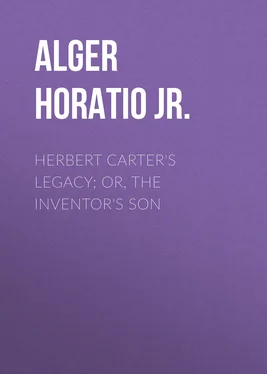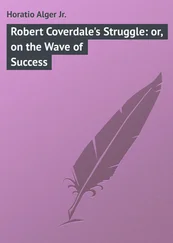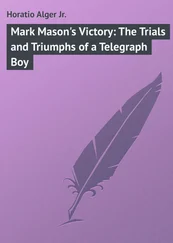Horatio Alger - Herbert Carter's Legacy; Or, the Inventor's Son
Здесь есть возможность читать онлайн «Horatio Alger - Herbert Carter's Legacy; Or, the Inventor's Son» — ознакомительный отрывок электронной книги совершенно бесплатно, а после прочтения отрывка купить полную версию. В некоторых случаях можно слушать аудио, скачать через торрент в формате fb2 и присутствует краткое содержание. Издательство: Иностранный паблик, Жанр: foreign_children, literature_19, foreign_antique, foreign_prose, на английском языке. Описание произведения, (предисловие) а так же отзывы посетителей доступны на портале библиотеки ЛибКат.
- Название:Herbert Carter's Legacy; Or, the Inventor's Son
- Автор:
- Издательство:Иностранный паблик
- Жанр:
- Год:неизвестен
- ISBN:нет данных
- Рейтинг книги:4 / 5. Голосов: 1
-
Избранное:Добавить в избранное
- Отзывы:
-
Ваша оценка:
- 80
- 1
- 2
- 3
- 4
- 5
Herbert Carter's Legacy; Or, the Inventor's Son: краткое содержание, описание и аннотация
Предлагаем к чтению аннотацию, описание, краткое содержание или предисловие (зависит от того, что написал сам автор книги «Herbert Carter's Legacy; Or, the Inventor's Son»). Если вы не нашли необходимую информацию о книге — напишите в комментариях, мы постараемся отыскать её.
Herbert Carter's Legacy; Or, the Inventor's Son — читать онлайн ознакомительный отрывок
Ниже представлен текст книги, разбитый по страницам. Система сохранения места последней прочитанной страницы, позволяет с удобством читать онлайн бесплатно книгу «Herbert Carter's Legacy; Or, the Inventor's Son», без необходимости каждый раз заново искать на чём Вы остановились. Поставьте закладку, и сможете в любой момент перейти на страницу, на которой закончили чтение.
Интервал:
Закладка:
“That is something I never think of,” said Tom, candidly. “I am a genuine republican.”
“I am not,” said James. “I should like to live in England, where they have noblemen.”
“Not unless you could be a nobleman yourself, I suppose?”
“No; of course not.”
By this time Mr. Spencer and Herbert were bringing the trunk into the front entry.
“I shouldn’t think a professional gentleman like your father would like to be seen carrying a trunk across the street,” said James.
“Oh, he don’t care for that; nor should I,” said Tom.
Herbert entered the room.
“Well, Herbert, what luck?” asked Tom.
“Better than I expected,” said Herbert, gayly. “What do you say to that?” and he displayed the gold and silver.
“How much is it?” asked James, his vanity melting under the influence of curiosity.
“Fifty-two dollars.”
“Capital!” said Tom.
“It isn’t much,” said James, in a tone of depreciation.
“I’ll bet Herbert is richer than you, James,” said Tom, in a lively manner. “Can you show as much money as that?”
“I shall be a rich man some day,” said James, with an air of importance.
“Your father may fail.”
“The moon may be made of green cheese,” retorted James, loftily. “How about the clothes? Are you going to show them?”
“I think not,” said Herbert.
“A parcel of rags, I suppose,” said James, with a sneer.
“Not quite so bad as that,” responded Herbert, good-naturedly. “Still, I think I shall hardly venture to wear any of them without alteration.”
“I wouldn’t wear second-hand clothes,” remarked James Leech, in his usual amiable tone.
“Perhaps you would if you were poor,” said Herbert, quietly.
“But I am not poor.”
“Fortunately for you.”
“Then you won’t show the clothes? I suppose they look as if they were made in the year one.”
“For our forefather Adam?” suggested Tom, laughing. “I am inclined to think the old gentleman in question hadn’t clothes enough to fill a trunk as large as that.”
“Probably not,” said Herbert; “he had no uncle, you know, to leave any to him.”
“What are you going to do with your money, Carter?” asked James, whose curiosity got the better of his dignity occasionally.
“I haven’t made up my mind yet. I think I shall find plenty of uses for it.”
“What would you do with it if you had it, James?” asked Tom.
“I can have more if I want to. I have only to ask father.”
“Then you’re better off than I. Say, father, will you give me fifty-two dollars?”
“When you are twenty-one I may do it.”
“You see,” said Tom. “But you haven’t answered my question. What would you do with the money if you had it?”
“I think I would buy a new rowboat; there’s a pond near our house.”
“When you get it send for me, and I’ll help you row.”
“Very well,” said James; but he did not answer very positively. In fact, he was by no means sure that his father would comply with his request for money, although it suited him to make this representation to his companions.
Herbert retired early. It had been a fatiguing day for him, and it would be necessary to rise in good season the next day, as the coach left Randolph for Wrayburn at an early hour.
CHAPTER VIII
HERBERT’S RETURN
Mrs. Carter awaited Herbert’s return with interest. She felt lonely without him, for he had never before been away from home to stay overnight. But there was a feeling of anticipation besides. Her hopes of a legacy were not very strong, but of course there was a possibility of her uncle’s having remembered them in his will.
“Even if it is only five dollars, it will be welcome,” she thought. “Where people are so poor as we are, every little helps.”
She sat at her sewing when the stage stopped before the door.
“I’m glad he rode home,” thought the widow; “the walk both ways would have been too fatiguing.”
“But why does not Herbert come in at once?”
He had gone behind the coach, and the driver was helping him take down a trunk.
“Where did he get it?” thought his mother, in surprise.
“I guess you can get it into the house yourself,” she heard the driver say.
“Yes, I’ll manage it; you needn’t wait,” said Herbert.
The driver cracked his whip, and the lumbering old coach drove on.
“Oh, there you are, mother,” said Herbert, looking toward the house for the first time. “I’ll be with you in a minute.”
And he began to draw the trunk in through the front gate.
“Where did you get that trunk, Herbert?” asked Mrs. Carter.
“Oh, it’s my legacy,” said Herbert, laughing. “Here it is,” and he lifted it up, and laid it down in the front entry.
“What is inside?” asked his mother, with natural curiosity.
“It isn’t full of gold and silver, mother, so don’t raise your expectations too high. It contains some clothes of Uncle Herbert, out of which you can get some for me.”
“I am glad of that, for you need some new clothes. Well, we were not forgotten, after all.”
“You don’t seem disappointed, mother.”
“I might have wished for a little money besides, Herbert; but beggars cannot be choosers.”
“But sometimes they get what they wish for. Uncle Herbert left you a legacy of a hundred dollars.”
“A hundred dollars!” said Mrs. Carter, brightly. “Why, that will be quite a help for us. Was it left to me?”
“Yes, to you.”
“It was kind in your uncle. My legacy is more than yours, Herbert.”
“I don’t know about that, mother; look here!”
And Herbert displayed his gold and silver.
“Here are fifty-two dollars that I found in the pocket of a vest. It belongs to me, for the will says expressly that I am to have the trunk and all it contains.”
“I am really glad,” said his mother, joyfully. “We are more fortunate than I expected. Sit down and tell me all about it. Who got the bulk of the property?”
“None of the relations. It is bequeathed to the town of Randolph, to found a high school, to be called the Carter School.”
“Well, it will do good, at any rate. Didn’t the other relations receive legacies?”
“Small ones; but they didn’t seem very well satisfied. Do you know Mr. and Mrs. Josiah Pinkerton?”
“Slightly,” said Mrs. Carter, smiling. “Were they there?”
“She was, and he was in attendance upon her. She didn’t give him a chance to say much.”
“I have always heard she kept him in good subjection. How did they fare?”
“They and their two children received a hundred dollars apiece. She was mad and wanted to break the will. Then there was a Mr. Granger, a farmer, who got the same; and Cornelius Dixon, also.”
“I hope Aunt Nancy fared better. She is the best of them all.”
“She is allowed to occupy the house, rent free, and is to have an income of two hundred dollars a year as long as she lives.”
“I am really glad to hear it,” said Mrs. Carter, with emphasis. “She deserves all her good fortune. One of the best things her brother did in life was to allow her such an income as to keep her independent of public charity; I feared he would forget to provide for her.”
“She seems a good old lady. She asked me to invite you to call and see her.”
“I should like to do so, and if I ever have occasion to go to Randolph I will certainly do so.”
“Now, mother,” said Herbert, when he had answered his mother’s questions, “I want you to take this money, and use it as you need.”
“But, Herbert, it was left to you.”
Читать дальшеИнтервал:
Закладка:
Похожие книги на «Herbert Carter's Legacy; Or, the Inventor's Son»
Представляем Вашему вниманию похожие книги на «Herbert Carter's Legacy; Or, the Inventor's Son» списком для выбора. Мы отобрали схожую по названию и смыслу литературу в надежде предоставить читателям больше вариантов отыскать новые, интересные, ещё непрочитанные произведения.
Обсуждение, отзывы о книге «Herbert Carter's Legacy; Or, the Inventor's Son» и просто собственные мнения читателей. Оставьте ваши комментарии, напишите, что Вы думаете о произведении, его смысле или главных героях. Укажите что конкретно понравилось, а что нет, и почему Вы так считаете.












